

Code of Best Practices in Fair Use for Media Literacy Education. Coordinated by: The Media Education Lab, Temple University The Program on Information Justice and Intellectual Property, American University Washington College of Law The Center for Media & Social Impact, American University.
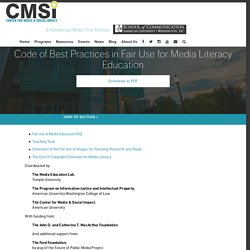
Educational Uses of Non-coursepack Materials - Copyright Overview by Rich Stim - Stanford Copyright and Fair Use Center. Unlike academic coursepacks, other copyrighted materials can be used without permission in certain educational circumstances under copyright law or as a fair use.
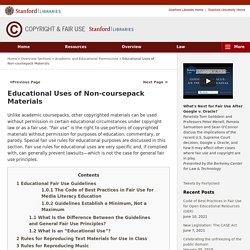
“Fair use” is the right to use portions of copyrighted materials without permission for purposes of education, commentary, or parody. Special fair use rules for educational purposes are discussed in this section. Copyright and Fair Use - UMUC Library. You’ll Never Be Famous — And That’s O.K. - The New York Times. As for Dorothea, after the Reverend Casaubon dies, she marries her true love, Will Ladislaw.
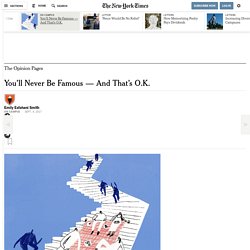
But her larger ambitions go unrealized. At first it seems that she, too, has wasted her potential. Tertius’s tragedy is that he never reconciles himself to his humdrum reality. Dorothea’s triumph is that she does. Creativity, Copyright, and Fair Use For Ethical Digital Citizens. Raising Digitally Balanced Kids: Cybersafety Resources- Dave Eisenmann. Teaching Copyright. Understanding Your Students: A Glimpse into the Media Habits of Tweens and Teens. For today's tweens and teens, technology is part of the fabric of everyday life.
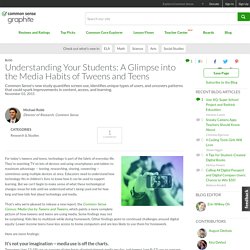
They're watching TV on lots of devices and using smartphones and tablets to maximum advantage -- texting, researching, sharing, connecting -- sometimes using multiple devices at once. Educators need to understand how technology fits in children's lives to know how it can be used to support learning. But we can't begin to make sense of what these technological changes mean for kids until we understand what's being used and for how long and how kids feel about technology and media. Copyright Kids!
Digital Citizenship Resource Page - Google Docs. The Next Tech Thing: Minnesota Trends in Social Media, Cyberbullying, and Digital Citizenship. For the past eight years I have had the privilege to speak about digital citizenship and cyber safety to tens of thousands of secondary students and parents in over 70 public and private school districts across Minnesota.
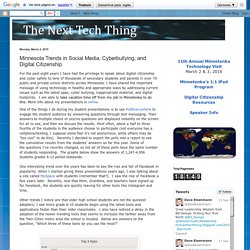
I have shared the important message of using technology in healthy and appropriate ways by addressing current issues such as the latest apps, cyber bullying, inappropriate material, and digital footprints. I am able to take vacation time off from my job in Minnetonka to do this. More info about my presentations is online. One of the things I do during my student presentations is to use PollEverywhere to engage the student audience by answering questions through text messaging.
Facebook Should Pay All of Us. 7 Sins. Answers for teens about the law. 12 Good Resources for Teaching Digital Citizenship - A PDF Handout. The Marshall Memo Admin - Issues. 1.
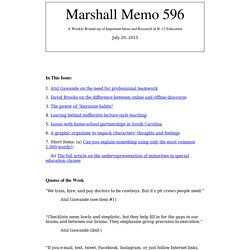
Atul Gawande on the need for professional teamwork 2. David Brooks on the difference between online and offline discourse 3. The power of “keystone habits” 4. 5. 6. 7. (b) The full article on the underrepresentation of minorities in special education classes. Paying Attention to Technology: Writing Technology Autobiographies. Overview Featured Resources From Theory to Practice As citizens of a highly technological culture, our students see (and often use) technologies as a daily experience.
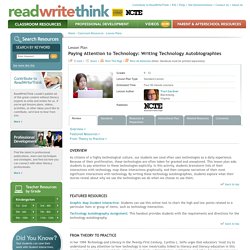
Because of their proliferation, these technologies are often taken for granted and unexplored. This lesson plan asks students to pay attention to these technologies explicitly. Participant Media: Eyes Wide Open FROM COLOR HD MEZZ_CREDITCHANGE_V2.mp4. Remix: Teaching Students to Verify Social Media Content. Misinformation can spread like a disease on social media.
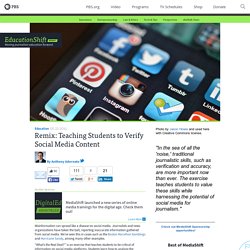
Journalists and news organizations have taken the bait, reporting inaccurate information gathered from social media. We’ve seen this in cases such as the Boston Marathon bombings and Hurricane Sandy, among many other examples. “What’s the Real Deal?” Facebook CIA Project: The Onion News Network ONN. 13 of the Best Media Literacy Resources for 2014.
The American Academy of Pediatrics (AAP) reports that children spend an average of seven hours a day consuming various types of media.
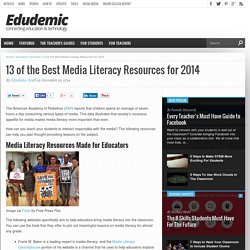
This data illustrates that society’s voracious appetite for media makes media literacy more important than ever. How can you teach your students to interact responsibly with the media? The following resources can help you plan thought-provoking lessons on the subject. Bits.blogs.nytimes. HONG KONG — Despite a glimmer of progress after talks in March between the United States and China over a potential technology trade war, little has changed, according to a letter sent by trade groups to Chinese leaders on Monday.
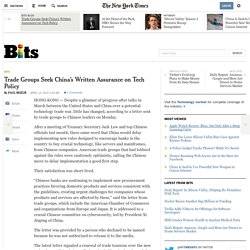
After a meeting of Treasury Secretary Jack Lew and top Chinese officials last month, there came word that China would delay implementing new rules designed to encourage banks in the country to buy crucial technology, like servers and mainframes, from Chinese companies. American trade groups that had lobbied against the rules were cautiously optimistic, calling the Chinese move to delay implementation a good first step. Their satisfaction was short-lived. Building Blocks for Digital Citizenship. What Are You Looking At. Building Blocks for Digital Citizenship. Digital Citizenship School Program. Download Digital Citizenship Agreements On an August morning in 1991 the World Wide Web had officially been introduced into our lives. Had we any idea at the time the change that was to come? What may have seemed like a novelty at first began to attract more and more curiosity and interest as we started to see its potential.
Potential became necessity and invention spawned again and again. The Internet we know today grows exponentially. We have adapted to its presence as a constant, and the idea of its absence seems nearly unimaginable to us. When we think about it, it makes sense to cultivate empowered individuals that are dutifully aware of their responsibility both for and with the power of the Internet for the lasting well-being of our global community.
Defining the Digital Citizen A starting point for creating a new level of ethical consciousness among our global individuals is to define the characteristics of the global digital citizen. Can I Use That? A Guide to Creative Commons - Google Docs. You're in charge. Digital Citizenship brochure. InCtrl. This Teacher Just Gave Her Pupils A Hell Of A Lesson About Online Privacy - BuzzFeed News. Www.powersearchingwithgoogle.com/course/ps/assets/PowerSearchingQuickReference.pdf. Dan-IRE-Tipsheet-2014. Mixed Messages And Simple Truths. On Monday, I heard Dylan William say that computers don’t make a difference to learning in the classroom. On Thursday, I heard Gerry White say that technology is responsible for a 12% increase in achievement. Both asserted that their statements were backed by research.
Dylan William said on Monday (and Friday), “You are entitled to your own opinions. Beyond Emily: Post-ing Etiquette. Educators offer guidelines for promoting good online behavior. Some educators are leading the way to school-based netiquette education with guidelines advising students on what to do, and what to avoid, in online communication. We've put together excerpts from some sample guidelines. A space: commenting. Here are some tips to help you leave more effective comments for your fellow bloggers.I really like this post because ____________________I agree with you when you say ________________ because _______________I disagree with you when you say ______________ because ______________When you talk about _________________, it makes me thing about ________________ because ______________Something about _____________ that you might not know is _____________Something I learned from reading this is _______________This is great!
It reminds me of _______________ because ___________I think I understand what you are saying, but could you please explain ________________? Our Digital Lives on Pinterest. Henry Sibley Presents: Managing Your Digital Footprint. The "New and Improved" Digital Citizenship Survival Kit. I have been thinking about some "new" items I could add to my original Digital Citizenship Kit that I created last year. Like I said in that blog post, I love using props when teaching. After some great conversations with the good wife @jenbadura on what I should include, I have come up with some new items to include in the survival kit. Yes, you can use this with your students! After I blogged about the original kit, I had a plethora of teachers email me or send me a tweet me asking if it was okay to use this idea at their school.
Please do! Packet of Seeds Any packet of seeds will do for your kit. Plug In I used a six foot extension cord and cut it so that I have the male and female end together. Mirror Imagine having the mirror attached to your computer/device. Sheet of Paper One of the most powerful items in the kit. Www.in.gov/legislative/ic/archive/2013/ic/2013/title20/ar33/ch8.pdf. A Google a Day. Google Tips, Tricks & Hacks. Search Education – Google.
Top 10 Clever Google Search Tricks. SearchReSearch. Critical Search Skills Students Should Know. There is a new digital divide on the horizon. Digital Literacy – web researching. What is Digital Citizenship? Teaching Screenagers:Character Education for the Digital Age. Our current technological trajectory promises unfathomable, roller-coaster innovation with no braking system. While the ride is exciting, it moves so quickly that we typically don't have time to think about the possible unintended consequences that might accompany it. Digital Citizenship. Elements of Digital Citizenship. Curriculum. Ethics 4 A Digital World. Ms. Gerla on Pinterest. Digital Citizenship. Five-Minute Film Festival: Teaching Digital Citizenship.
Examples 6.3. 5 Reasons You Should Be Teaching Digital Citizenship. THE Journal November 2013. Information Literacy. Access and Evaluate Information. Teaching Copyright. As today's tech-savvy teens become increasingly involved with technology and the Internet for learning, work, civic engagement, and entertainment, it is vital to ensure that they understand their legal rights and responsibilities under copyright law and also how the law affects creativity and innovation. This curriculum is designed to give teachers a comprehensive set of tools to educate students about copyright while incorporating activities that exercise a variety of learning skills. Project SAILS (ProjectSAILS) ACRL 2013: Interview with Melanie Sellar About Information Literacy Narratives.
On the second day of the ACRL 2013 Conference, we had the great pleasure of having lunch with Melanie Sellar. Melanie is currently the Education Services Librarian at Marymount College in Los Angeles. During the ACRL Conference, Melanie was leading a session titled, “Visible Thinking: Using Course-Integrated Research Narratives to Engage Students and Assess Learning.”
We invited her to lunch so we could hear more about her session and understand the value of research narratives in information literacy instruction. Below is the Q and A portion of our lunch with Melanie: K12 Schools Must Fill Need For Digital Media Skills. A weak economy paired with a national push to improve reading and math as well as other core subjects has left an important skill behind in K12 classrooms—digital media literacy. A report released this past July out of Northwestern University, "Trust Online: Young Adults' Evaluation of Web Content," reveals that college students are not so media savvy when it comes to discriminating between credible sources online. The study includes information from more than 1,000 first-year students in an urban public research university in 2007. Digital Citizenship Ribble Final.